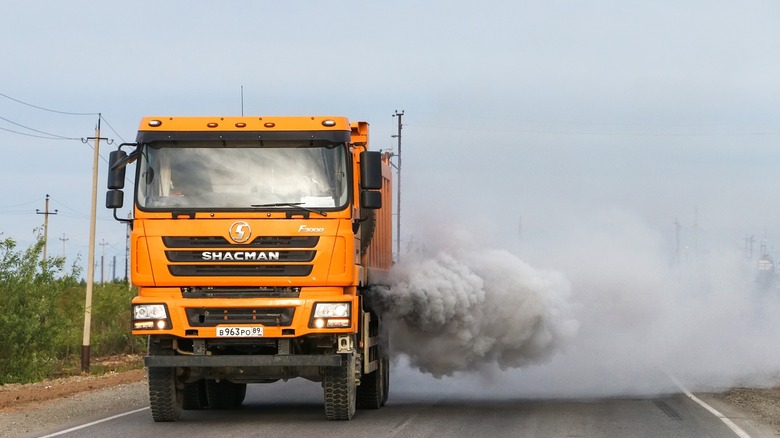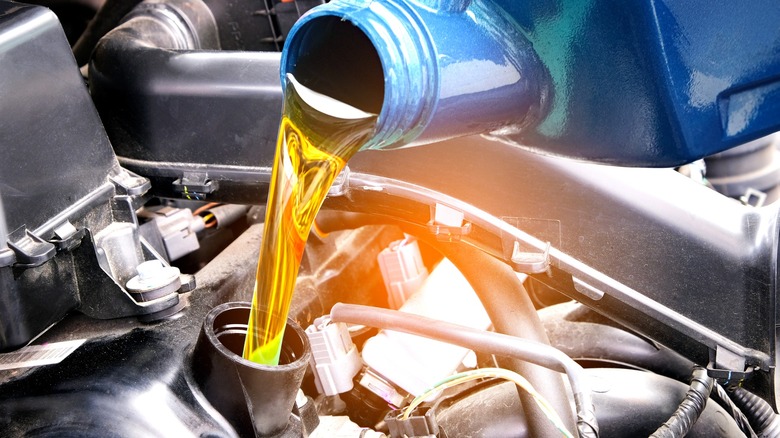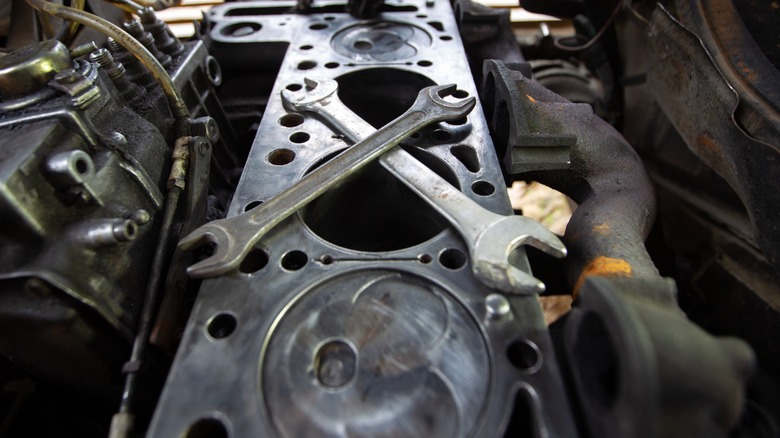What Is Blowby On A Diesel Engine And Can It Be Fixed?
Internal combustion engine blowby, whether gasoline or diesel, occurs when part of the compressed mixture of air and fuel leaks past the piston rings during the compression or power strokes of a four-cycle engine. This condition causes various problems ranging from decreased fuel economy to a potential engine runaway, but performing essential diesel engine maintenance can reduce its causes and help you avoid costly repairs.
Diesel engines benefit from heavy-duty components and low rpm operation. The lubricating properties of diesel fuel allows them to last longer than gasoline engines on average with proper maintenance. However, skipping routine preventive maintenance is just one of the bad habits that might ruin your diesel engine.
Blowby is one of the early warning signs of a failing diesel engine. The Universal Technical Institute (UTI) says that blowby is caused by a number of factors, including worn piston rings, eroded pistons, scored cylinder walls, and carbon buildup. Symptoms include white smoke from the oil fill tube, loss of power, increased oil consumption, and decreased fuel efficiency.
How to tell if a diesel engine has blowby
While a definitive diagnosis requires a qualified diesel technician, it's possible to check for blowby yourself at home. Start by taking the oil filler cap off with the engine running and watch for white smoke. Next, place the filler cap upside down on the filler tube. If it bounces around more than expected from normal engine vibrations or blows off completely it could be caused by engine blowby, according to UTI.
Diesel engines suffering from excessive blowby will have reduced power output and use more fuel. Reduced power results from lower compression and less fuel-air mixture in the combustion chamber since some of the mixture leaks out before the power stroke occurs. Blowby gasses also increase the pressure inside the crankcase, causing increased oil consumption and oil leaks.
Blowby will only worsen if ignored and left untreated. The effects of increasing blowby include further damage to pistons and cylinder walls as well as other engine components. The most alarming condition caused by blowby is a runaway engine, where the recirculated crankcase gasses contain enough fuel to boost engine output uncontrollably.
How to avoid diesel engine blowby
Routine diesel engine maintenance is your first line of defense to prevent diesel engine blowby. One of the most critical maintenance items to prevent blowby is keeping your crankcase filled with quality oil that meets the manufacturers specifications for type and viscosity. Routine oil and oil filter changes keep internal engine components within spec longer than operating with dirty oil. In addition, keeping the air filter clean keeps dust out of the fuel-air mixture and reduces cylinder wear.
Carbon buildup on the piston rings and valves is another cause of blowby. Using a high-quality diesel fuel that contains detergents designed to prevent carbon buildup is an easy way to ensure longer life from your diesel engine. While we're on the subject of fuel, be sure to check and maintain your fuel system water separator as scheduled by the owners' manual.
According to UTI, all diesel engines experience minimal levels of blowby when the engine is running at normal operating temperature. It's worse when the engine is revved above idle before it's had a chance to warm up. Furthermore, over-revving a cold diesel engine can cause premature engine wear resulting in increased blowby even in low-mileage diesel engines.
Can diesel engine blowby be fixed?
Once a diesel engine becomes worn enough to experience engine blowby outside of factory specifications, there's little chance of reversing the process. However, Installing an air oil separator could help to reduce some of the symptoms. An air oil separator functions by separating motor oil particles from crankcase blowby gasses before they're recirculated back into the air intake system.
Rebuilding or replacing the engine is the only real cure for excessive diesel engine blowby. Often, the most economical and timely way to get a fresh diesel engine for your vehicle is to install a remanufactured engine instead of rebuilding the old one. A quality remanufactured diesel engine is almost as good as a new one, with all parts being cleaned, inspected, and restored to factory specifications.
Either option will likely cost a few thousand dollars and leave you without your vehicle for weeks or more. Preventing the causes of blowby with a comprehensive maintenance schedule is much cheaper and more convenient.



